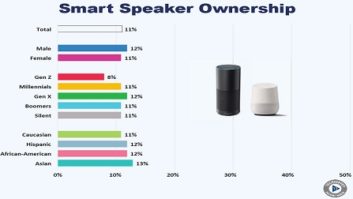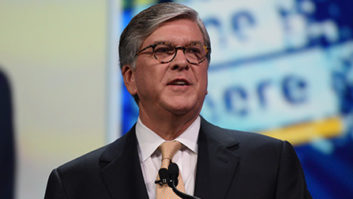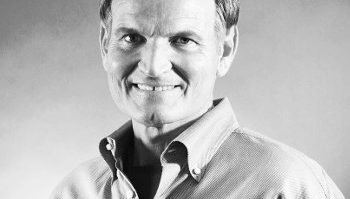MOUNTAIN VIEW, Calif. The departure of dMarc Broadcasting founders and brothers Chad and Ryan Steelberg from Google could signal problems with the Internet company’s Audio Ads venture, some radio industry analysts believe. Google meanwhile says it remains committed to the closely watched project, now in beta testing.
dMarc founders Chad and Ryan Steelberg, who came to Google after selling their company to the Internet giant in January 2006, left Google this February. The brothers have chosen to not speak publicly about their departure. Ryan Steelberg had been director of Google’s radio operations while Chad was general manager of audio.
Google’s Audio Ads, a Web-based purchasing process for radio ads, was born of dMarc’s model of automatic ad insertion software used to fill broadcasters’ unsold inventory.
Google says it has approximately 700 radio stations and 20 online advertisers participating in the Audio Ads test, including some Emmis Radio stations. An Emmis spokesman said it has stations in Los Angeles, St. Louis and Austin, Texas, participating.
Rick Cummings, president of Emmis Radio, has said Google only has access to the group’s remnant inventory, but the Internet company was interested in discussing prime inventory.
Many broadcasters fear the auction-based system will drive down ad rates instead of helping their bottom lines. Google says its entry into radio placement sales will benefit the industry by creating incremental new business and therefore revenue.
dMarc Broadcasting, which had purchased Scott Studios in 2004, combined operations with an existing Google office in Newport Beach, Calif., following its purchase by Google. dMarc had nearly 100 employees when the sale was finalized, with most of them being retained by Google.
Google, headquartered in Mountain View, Calif., has more than 7,500 employees worldwide.
Guaranteed inventory elusive
Analysts say the fact that Google has struggled to reach agreements with broadcasters to secure guaranteed inventory, and not just leftover avails, could have been a factor in the Steelbergs’ resignation along with other considerations.
“I think things have progressed rather slowly for Google. I had expected a major radio deal to be done already. Limited inventory makes testing more difficult,” said David Bank, analyst for RBC Capital Markets. “But more importantly, I believe Google might be trying to tie the Audio Ads platform in with video content licensing, possibly YouTube content.”
Google spent $1.65 billion for YouTube in 2006. Disputes about the use of copyrighted materials on YouTube have created buzz throughout the entertainment industry.
Bank said the Steelbergs possibly felt frustrated that the performance of their “earn out” was being tied to the progress of something that was completely outside their business. An earn out is a contractual arrangement in which the purchase price is stated in terms of a minimum, but the seller will be entitled to more money if the business reaches certain financial goals in the future, according to online reference sources. The financial goals usually are stated as a percentage of gross sales or earnings.
The Steelbergs, who enjoyed a big payday when they sold dMarc, stand to make a lot more if Audio Ads is successful. In addition to paying $102 million in cash for dMarc’s assets, Google is obligated to make additional contingent cash payments if certain targets are met through 2009. The company has never publicly disclosed those targets. Potential contingent payments could total $1.136 billion over that period, according to Google.
If hitting performance incentives and lack of progress were key to the Steelbergs’ unrest, leaving Google now seems ill-timed, some analysts said.
Departure inevitable?
The brothers “stood to gain a significantly greater sum of money had they stayed,” said Marci Ryvicker, analyst with Wachovia Capital Markets. “I believe this signals that there are some unexpected difficulties” with Audio Ads.
Ryvicker said various broadcast groups told her they do not intend to provide Google/dMarc with guaranteed inventory, fearing loss of control over ad rates.
“For something this big to be successful there needs to be trust and communication among all parties and I don’t believe there is yet between Google and the radio industry,” Ryvicker said.
Google reportedly has been talking to CBS Radio, Clear Channel and others about purchasing a substantial amount of unsold inventory.
Other analysts, though, believe the departure of the brothers from Google was inevitable.
“It’s certainly not unusual for ‘Captains of Assets Acquired’ to leave the mother ship once the deal is done. In fact, it’s more the norm than not,” said Bishop Cheen, analyst with Wachovia Capital Markets.
John Sanders, analyst with Bond & Pecaro, said, “The departure of the Steelberg brothers should not be surprising because it follows the common pattern of culture clashes that follow these types of acquisitions and also highlights why many large acquisitions run into trouble.”
But Sanders said Audio Ads’ results so far appear to be falling short.
“The Google approach to radio advertising sales has been very automated and essentially has resulted in the devaluation of leftover inventory selling at very low rates with a large commission to Google and low return to stations.”
Google issued a statement in response to queries about the change: “Google is committed to the audio business. We will continue to gather feedback during the Audio Ads beta test and are happy with the progress to date. We remain focused on delivering value to the radio industry as we continue to expand radio station inventory and enhance the product so that it’s ready for all advertisers.”












